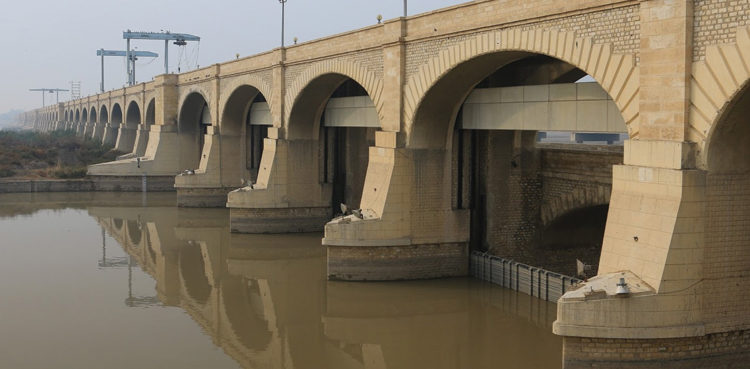
Irrigation Ministers of two provinces hold meeting in Karachi; Balochistan urges Sindh to carryout desilting of Khirthar and Pat Feeder canals
Sindh Courier Report
Karachi
Despite faced with scarcity of water due to short releases by Indus River System Authority (IRSA), Sindh, as a gesture of good will, has assured Balochistan of resolving its water woes.
Sindh gave assurance to Balochistan of resolving the issue when its Minister of Irrigation Mir Muhammad Khan Lehri held meeting with Sindh Minister for Irrigation Jam Khan Shoro at his office in Karachi on Thursday.
They discussed about the water issues confronting the two provinces including the water availability situation in Khirthar canal and Pat Feeder canal.
During the meeting, Sindh Minister Jam Khan Shoro and his counterpart Mir Muhammad Khan Lehri agreed upon to resolve the water issue between the two provinces through mutual consultation and talks.
Lehri demanded providing water as per gauge to Balochistan at RD 109 of Pat Feeder canal and also asked for carrying out its desilting.
On this, Sindh Minister Jam Khan Shoro directed the Secretary Irrigation department, Suhail Ahmed Qureshi for taking measures for the early solution of water related issues of Balochistan.
Earlier, on November 22, Sindh Chief Minister Syed Murad Ali Shah had talked to Chief Minister Balochistan Kudus Bizenjo on telephone and invited him to discuss water issues and settle them amicably in December.
The water shortage issue in Balochistan was raised by Mir Changez Khan Jamali, the President PPP Baluchistan, who called on Sindh Chief Minister at CM House.
Murad Ali Shah told him that people of Balochistan were our brothers. “Sindh is the second home of people of Balochistan so how can we take their water. We want to accommodate them,” he had said.
Shah told him that when water level at Sukkur Barrage remains low the Kirthar/Jhal Magsi Canal could not take water. “During water shortages not only Balochistan but Sindh also faces shortage,” he said.
Shah had suggested Balochistan CM to have a meeting with him along with the experts of both the provinces and discuss how the issue of the shortage could be settled.
It is pertinent to mention that the Balochistan has constantly been accusing the Sindh of depriving it of water from Indus River not realizing certain facts that include low level of water in the river and the theft of water by big landlords in the border area of two provinces. Even, during the IRSA meetings, the Balochistan representative had been blaming Sindh and making its (Sindh’s) case weak for due share of water as per 1991 Water Accord.
Sindh had repeatedly been raising voice for its due share of water. Even on Wednesday, provincial Irrigation Minister told in a press conference that Sindh continues to suffer due to water shortage as the Indus River System Authority (IRSA) doesn’t release Sindh’s due share of water in violation of 1991 Water Accord.
Jam Khan Shoro, who was accompanied by Information Minister Saeed Ghani, said that denying Sindh of due share of water would also create acute water shortage in Balochistan.
“Beside the shortage of water in Rice Canal, Dadu Canal and other canals, there is no discharge of water to the and as a result sea intrusion has also chipped away 2.2 to 3.2 million acres of agricultural land in coastal belt of province,” Shoro told.
Meanwhile, when Sindh Courier sought the opinion of an expert – Fazlullah Qureshi, the former Additional Chief Secretary of Sindh, who had retired as Federal Secretary, he said:
“Historically, the Balochistan has no right on Indus River water, as there were no canals in the past to draw water from river for Balochistan. It was only during British Raj that Sukkur Barrage was built and Khirthar canal was dug to irrigate vast lands lying barren in Balochistan area.”
According Mr. Qureshi, there are two main factors behind the short supply of water to Balochistan. The first one is low releases of water to Sindh in Indus River, which reduces the water level at the mouth of canal. “Sometimes, Sindh raises the water level artificially by putting the planks at barrage to release the water to Khirthar canal.”
“Another factor is the theft of water by big landlords in border areas of two provinces. This deprives the tail-end growers of water in Balochistan, same as happens with tail-enders in Sindh,” he told.
The Balochistan also receives water from Kachhi Canal located in Punjab. It is a 399 km long canal, out of which 305 km is in Punjab and 94 km is in Balochistan. It starts from Taunsa Barrage at Indus River. The canal provides irrigation water supply to 72,000 acres of agricultural land in south of Punjab and Baluchistan.
____________________